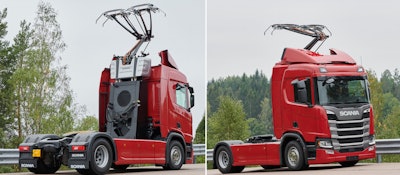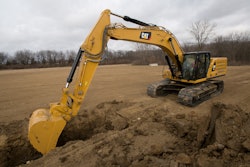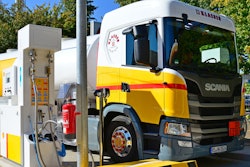
Scania is to supply vehicles for the three Germany e-highway trials that are expected to start next year. The decision was taken on behalf of the German Federal Ministry for Environment, Nature Conservation and Nuclear Safety (BMU), following a public tender process.
Trials will initially commence in Hessen along the A5 Autobahn, where the 5 km e-highway infrastructure with electric power supplied from overhead lines in both directions has been completed. Next will be an e-highway segment on the A1 Autobahn to the Port of Lübeck, with additional stationary charging capacity planned at the port. This highway section is expected to open during summer 2019. Finally, the third e-highway is expected be established in Baden-Württemberg along a section of the B462 federal road early 2020.
The 15 trucks will be equipped with pantograph power collectors, developed by Siemens, mounted on the frame behind the cab for charging while in motion. These trucks will be operated by haulage companies in actual transport operations. Delivery of the first hybrid R 450 truck by Scania for Hessen is scheduled for May 2019. In addition to delivering trucks, Scania will manage vehicle maintenance and data collection from the trials.
Scania has previously been selected as partner in the concurrent research project conducted by Volkswagen Group Research. A hybrid Scania R 450 is expected to be delivered to the project in February and commissioning is ongoing on Siemens test track outside Berlin. A second electrified research vehicle will be delivered in autumn 2019. The research program will seek to analyse and optimize the powertrain concept, energy management, hybrid transmission, battery ageing and the next-generation cooling system.
“Unlike passenger cars, which remain parked and stationary most of the day, trucks are deployed for long hours in transport assignments when stopping to charge can be highly disruptive in the operations. E-highways offer rational and effective charging en route. The solution also saves batteries and reduces load on the energy network,” says Magnus Höglund, Head of Electric Road System, Scania.
According to several studies, e-highways are an alternative that will significantly help to reduce CO2 emissions. Electrified road technology is one part of Scania’s sustainable transport solutions, which is now also being tested on German roads.



















